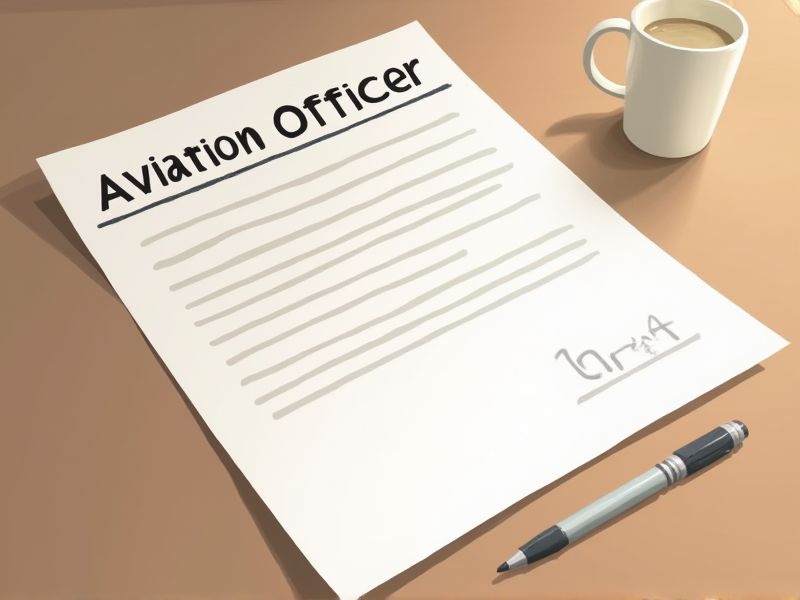
Aviation Officers play a crucial role in ensuring the safety and efficiency of air operations. They need specific certifications to validate their expertise and meet regulatory standards. These certifications ensure they possess the necessary skills in navigation, communication, and safety protocols. Here are some important certifications you may need as an Aviation Officer.
FAA Commercial Pilot License (CPL)
An FAA Commercial Pilot License (CPL) is essential for an Aviation Officer as it certifies their ability to operate aircraft with professionalism and skill. The CPL ensures compliance with stringent safety standards, a critical requirement for military and civil aviation roles. It also allows the officer to carry passengers or cargo, which is integral to many operational missions. Furthermore, obtaining the CPL signifies a mastery of advanced piloting techniques, enhancing the officer's proficiency and capability in demanding situations.
Instrument Rating (IR)
The Instrument Rating (IR) allows Aviation Officers to navigate through challenging weather conditions, enhancing safety. It ensures pilots can rely on cockpit instruments rather than visual cues, crucial for poor visibility situations. Earning an IR expands operational capabilities, permitting flights in a broader range of environments. Airlines and military services often require IR to ensure versatility and high standards in pilot proficiency.
Multi-Engine Rating (MER)
Aviation Officers require Multi-Engine Rating (MER) to handle larger, more complex aircraft that often serve in military and commercial operations. Multiple engines provide redundancy, crucial for ensuring safety during potential engine failures. The rating enhances operational capabilities, enabling missions that demand higher performance and longer distances. Proficiency in multi-engine aircraft is essential for career advancement and aligning with military aviation demands.
Certified Flight Instructor (CFI)
A Certified Flight Instructor provides essential training and ensures mastery of complex aviation skills needed by an Aviation Officer. As a CFI possesses deep knowledge of aircraft systems and flight dynamics, they help build foundational and advanced competencies. Proper training from a CFI reduces risks and enhances flight safety standards. CFIs also prepare Aviation Officers for decision-making scenarios they might encounter during missions.
FAA Airframe and Powerplant (A&P) Certification
FAA Airframe and Powerplant (A&P) Certification ensures a comprehensive understanding of aircraft maintenance protocols, directly impacting safety and efficiency. Certified Aviation Officers can perform and oversee complex repairs, reducing downtime and operational costs for their fleet. Regulatory compliance mandates certified personnel, mitigating risk of non-compliance penalties and enhancing trust with federal agencies. Possession of A&P Certification enhances employment prospects and career advancement opportunities within the aviation sector.
Certified Aviation Manager (CAM)
A Certified Aviation Manager (CAM) is needed for an Aviation Officer because it ensures a strong foundation in aviation management principles, enhancing operational efficiency. CAM certification demonstrates an officer's expertise in industry standards and best practices, promoting safety and regulatory compliance. It contributes to better decision-making and leadership skills, vital in high-pressure aviation environments. Having a CAM certified officer can lead to more streamlined processes and improved communication within aviation teams, supporting organizational goals.
IATA Operational Safety Audit (IOSA) Certification
The IATA Operational Safety Audit (IOSA) Certification is crucial for Aviation Officers as it enhances their credibility by ensuring adherence to internationally recognized safety standards. Possession of the certification can lead to improved operational efficiency, reducing the likelihood of costly safety incidents. The certification demonstrates a commitment to passenger safety, boosting public confidence in airline operations. Airlines with IOSA Certification are often favored in partnerships and alliances, expanding professional opportunities for Aviation Officers involved.
Airport Management Certification
Airport Management Certification equips aviation officers with specialized knowledge in airport operations, ensuring efficient and safe management. Trained officers understand regulatory compliance and adapt to rapidly changing aviation standards. Certification enhances problem-solving skills for unexpected challenges, reducing risks associated with operational disruptions. It also improves communication with international counterparts, vital for coordinating global aviation activities.
Project Management Professional (PMP)
Aviation Officers face complex logistical and operational challenges, and obtaining the Project Management Professional (PMP) certification equips them with structured methodologies to efficiently manage these tasks. The certification enhances their skills in risk management and quality control, which are critical in maintaining safety and compliance in aviation operations. Having PMP credentials can also boost credibility and demonstrate commitment to best practices in the aviation industry. The structured approach taught in PMP helps in breaking down large aviation projects into manageable components, ensuring timely execution and resource optimization.
Lean Six Sigma Green Belt
Lean Six Sigma Green Belt training equips aviation officers with skills to identify inefficiencies in operational processes, increasing overall efficiency and safety. By using data-driven methodologies, officers can systematically reduce waste and minimize errors, crucial for maintaining high standards in aviation. Mastery of these tools allows for better resource management, resulting in significant cost savings and enhanced service quality. This competency fosters a culture of continuous improvement, essential for adapting to the rapidly evolving demands in the aviation industry.
Summary
When you obtain certifications as an Aviation Officer, your career prospects can expand significantly. Certifications demonstrate enhanced expertise and proficiency, which can lead to higher responsibility roles. This recognition of skill may translate into increased earning potential and job stability. Consequently, such qualifications position you as a valuable asset within the aviation industry.
